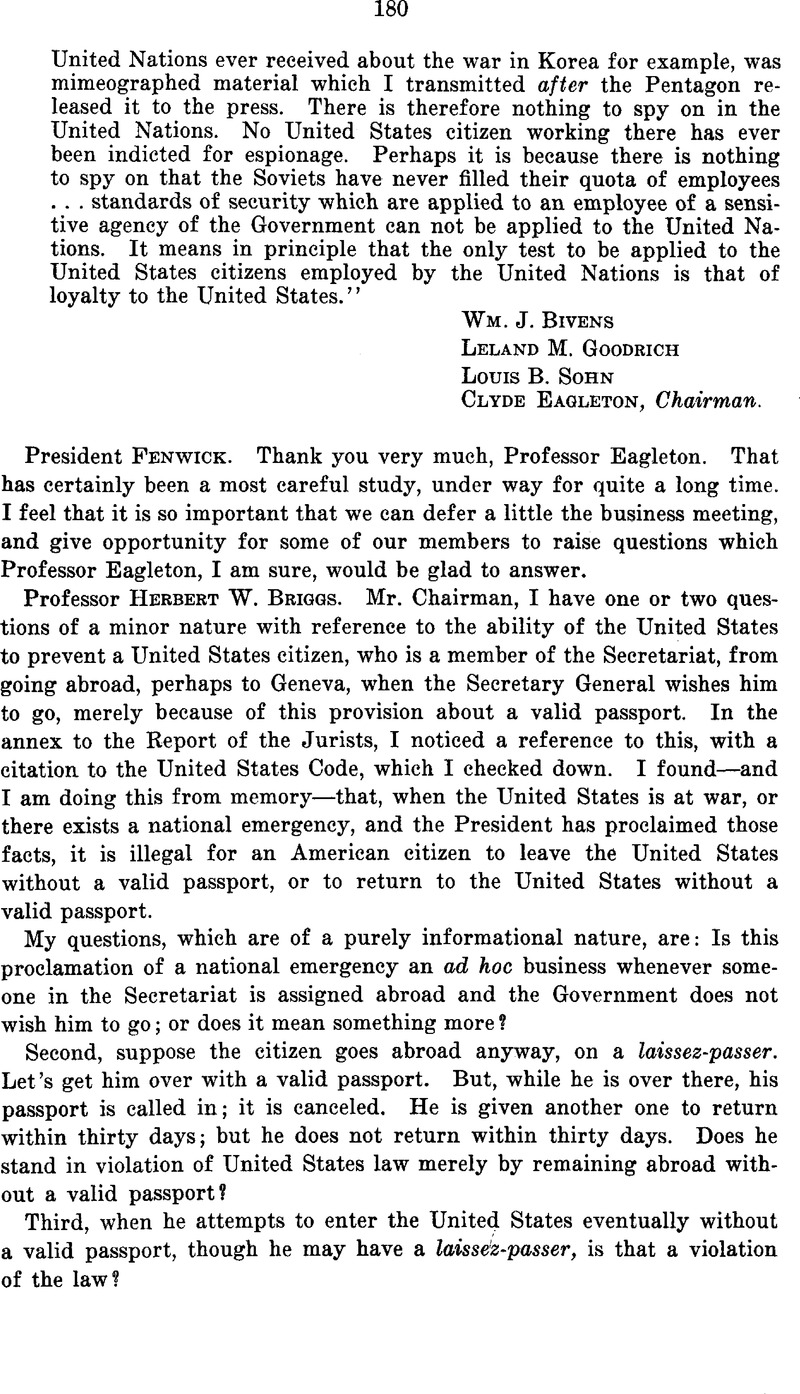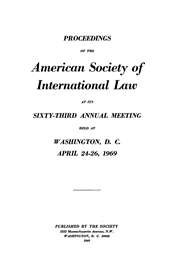No CrossRef data available.
Article contents
Discussion
Published online by Cambridge University Press: 05 April 2017
Abstract

- Type
- Fifth Session
- Information
- Proceedings of the American Society of International Law at its annual meeting (1921-1969) , Volume 48 , 1954 , pp. 180 - 184
- Copyright
- Copyright © American Society of International Law 1954
References
1 Hearings before the Subcommittee (of the Senate Committee on the Judiciary) to Investigate the Administration of the Internal Security Act, United States Senate, 82nd Cong., 2nd Sess., 1952, p. 414. Later, in a communication dated Jan. 7, 1953, to Representative Keating, Chairman of the Special Subcommittee to Investigate the Department of Justice, Mr. Byrnes explained his policy: “I did not wish to offer any recommendations of persons seeking employment at the United Nations nor did I want subordinate officials to offer recommendations without my knowledge and authority.” This, he said, was his personal conclusion, reached without a policy meeting and without consultation with Mr. Hiss. Hearings before the Subcommittee of the House Committee on the Judiciary to Investigate the Department of Justice, 82nd Cong., 2nd Sess., 1953, p. 296. Reported in the New York Times, March 24, 1953.
2 Hearings ... to Investigate the Administration of the Internal Security Act, pp. 330, 419. The memorandum in the Department of State entitled “Arrangements with the United Nations for the Provision of Information on United States Nationals” is reproduced at p. 415. Mr. Byron Price, Assistant Secretary General in charge of Administration, said that the Secretary General “repeatedly sought from Member Governments” information as to applicants. U.N. Doc. A/2364, Annex I, p. 2.
3 Ibid., par. 52. See “Activities of United States Citizens Employed by the United Nations,” Hearings before the Subcommittee to Investigate the Administration of the Internal Security Act, Pt. I, 82nd Cong., 2nd Sess.
4 U.N. Doc. A/2364, Annex III; printed in Supplement to the American Journal of International Law, Vol. 47 (1953), p. 87.
5 U.N. Doc. A/2364, Annex III. We have found no voice lifted in approval of the Commission of Jurists. Senator Holin in a strong speech in the Belgian Senate (Jan. 20, 1953) criticized both personnel and report. Four Canadian professors sent to the Canadian Bar Review (December, 1952) a letter condemning the Report. They asserted that “there should be no automatic transfer of national standards of employ-ability to the United Nations administration,” and that “the jurists’ opinion is far from an adequate definition of the role and legal position of the international civil servant.” See also the advisory opinion prepared for the Federation of International Civil Servants Associations (MFICS A/4/53).
6 U.N. Doc. A/2364; see also Docs. A/2367 and A/2376.
7 Ibid. The “presentment” of the Grand Jury was printed in full in the New York Times of Dec. 31, 1952. It may be asked whether publication was in violation of Tit. 18, Kule 6(e) of Federal Rules of Criminal Procedure relating to the Secrecy of Grand Jury Procedures.
8 S. 3 titled: “To prevent … purposes.” See U.N. Doc. A/2364, Annex IV, for text of this Bill. The Bill was passed by the Senate on June 8, 1953, with certain amendments. Cong. Rec, 83rd Cong., 1st Sess., pp. 6380-6381. For views of the II. S. Dept. of Justice on this Bill, see Senate Report No. 223 on “Preventing . . . United Nations,” p. 9; for views of the U. S. Dept. Of State, see ibid., p. 7.
9 The Report of the Secretary General on Personnel Policy (A/2364), from which we have been quoting, discussed other matters which we do not have space to include, such as privileges and immunities, or policy in cases of suspicion. Hearing before the Subcommittee to Investigate the Administration of the Internal Security Act. . . . “Activities of U. S. Citizens Employed by the United Nations,” Pt. II, 83rd Cong., 1st Sess., p. 449.
10 U.N. Doc. A/2533 (Nov. 2, 1953), Annex I.
11 Judgment No. 18; and see other judgments (AT/DEC.18 ff.). The total awards were $179,420. See General Assembly Resolution 785 (VIII).
12 New York Times, Sept. 10, 1953, and see note 3 above.
13 New York Times, Jan. 12, 1954.
14 U.N. Doc. A/2533, par. 65; see the New York Times, Sept. 2, 1953.
15 U.N. Docs. A/91 (1946), A/C.5/72. The United States position is stated in A/C.5/SE.420.
16 His report of March, 1953, was criticized and he was asked to report at the next General Assembly with suggestions as to personnel policy. See Doc. A/2534, Annex D.
17 U.N. Docs. A/C.5/SB.427; A/2630.
18 Dept. of State, Treaties and Other International Acts Series, No. 1676 (Pub. 3042) ; American Journal of International Law, Supp., Vol. 43 (1949), p. 8.
19 There was discussion in the Second and Third Committees : U.N. Docs. A/C.2/ SB. 118, 121, and A/C.3/SR. 273. For the Economic and Social Council, see Does. E/SB. 428; E/L. 123, and E/1863. The attitude of Mr. Lie is summarized in Doc. E/1862; his report on negotiations with the United States is Doc. E/1921. See also Resolution 340 (XI).
20 See U.N. Docs. E/SE. 435, 476; and Economic and Social Council Resolution 288 (X). In June, 1951, Mr. Malik of the Soviet Union, as President of the Security Council, wished to receive representatives of the World Peace Council; they were refused visas. Docs. S/2216; S/2218-2220; S/2242; S/2255; S/2307. In the spring of 1951, Mrs. Diaz, a member of the Italian Parliament, sought to attend the meeting of the Commission on the Status of Women and received her visa two days before the session ended, Docs. E/1997; E/CN.6/SH. 100. Other instances were those of Santi and Eskandary in May, 1952, and Madame LeClerc, to whom reference was made at the 743rd Meeting of the Economic and Social Council.
21 As to the Dessau case, see U.N. Docs. E/SR. 676, 678; E/CN.5/SE. 202 ‘and 208. As to the Luccoek case, see E/2386, and E/2397; E/CN.6/SR. 123, 127, 131, 133, 135. The delegate of Sweden suggested that the United States was not carrying out the Headquarters Agreement. See E/SE. 678; E/CN.5/SE. 202 and 208.
22 Printed in American Journal of International Law, Supp., Vol. 43 (1949), pp. 18-23.
23 U.N. Doc. E/2397. Mr. Wadsworth’s statements are to be found in Doc. E/SE. 679, and Press Release 1691 of the U. S. Mission.
24 Economic and Social Council, Official Records, 15th Seas., 686th and 687th meetings.
25 The only United Nations document is SG/298, which quotes a press release now out of circulation. The New York Times on April 30, 1953, and the New York Herald Tribune for May 2, 1953, carried the stories.
26 As to passports, see “Passport Bef usais for Political Reasons ; Constitutional Issues and Judicial Review,” in 61 Yale Law Journal (1952). Some improvement in the form of appeal in case of passport refusal was provided in 1952; see Federal Register, Vol. 17, pp. 8013-8014. Possibly, after clearances have been completed, it will not be difficult for United Nations officials of United States nationality to obtain passports.
27 New York Times, Jan. 1, 1953; Hearings of the Subcommittee to Investigate the Administration of the Internal Security Act … 83rd Cong., 1st Sess., pp. 451-460.


